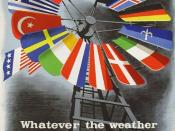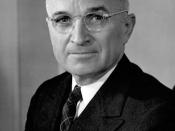In the early years of the Cold War, both the Truman and Eisenhower administrations pursued a policy of containment to counter perceived Soviet aggression. Generally, the presidential administrations pursued this policy to maintain stability in the international arena, to maintain a balance of power, and also in a sense, to express disapproval of totalitarian, non-democratic regimes. Containment was expressed through a variety of policies and institutions: economic, political and, of course, military. The ways the early presidential administrations defined and implemented containment strategy inevitably changed in focus, importance, and emphasis over time. While both external and internal reasons accounted to an extent for the specifics of the containment policies of both administrations, the Truman administration was more concerned with maintaining a balance of power within the international community than necessarily appeasing internal pressures, especially fiscal pressures. The Eisenhower administration, on the other hand, assigned a greater importance to domestic politics in formulating its containment policies.
First I will outline the differences of the two administrations, and then I will argue that the differences in the two administrations stem from their predominant influences: whereas external threats mainly shaped the Truman administration's containment policy, internal politics mainly shaped the Eisenhower administration's containment policy.
First of all, both administrations had different economic priorities. Although Truman was concerned about keeping taxes low and government spending capped, he also saw the need for military expenditures in Europe and Asia to keep an adequate balance of power. Truman implemented an assortment of aid packages to Europe and Asia, in effect, to help those countries help themselves. He saw economic stability as essential for peace and stability in the intentional arena. Moreover, he saw giving aid to these countries as a way to subtly influence the ideology of their constituents. Furthermore, Truman accepted ongoing government economic...


